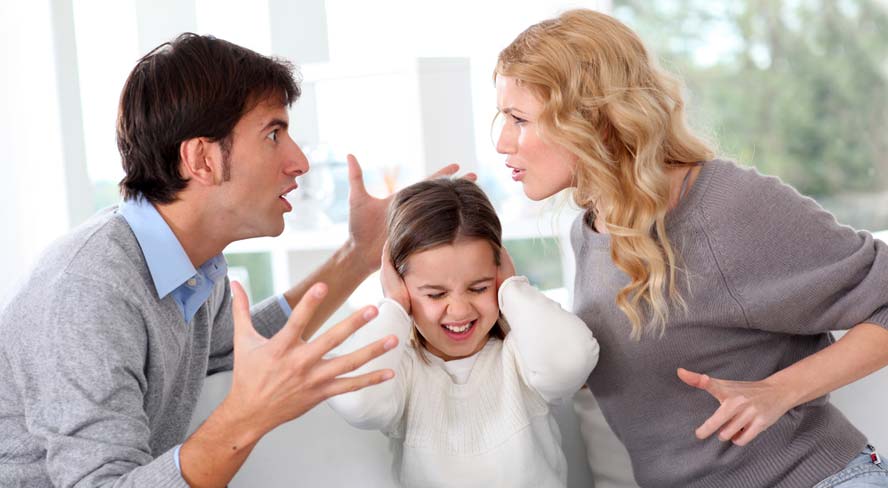
But for every good day, there were dozens of bad ones. There were many fights and screaming matches, mostly rooted in financial problems and their general stubbornness. Their relationship was one of extremes - it was either borderline blissful or miserable.
What does it mean that mom and dad are divorced but everyone remains under the same roof? I didn't have to bounce between two different homes. But I also grew up surrounded by conflict and thinking that that's simply how things are. It left me with a warped understanding of what normalcy in a partnership is supposed to look like.
Matt Mutchler, an assistant professor of counseling psychology at Delaware Valley University who has studied high-conflict divorces, appreciates the intent from parents who split up but continue to live together. But it's important to set boundaries, he cautions. "The parents have to be very clear that [they] aren't getting back together," Mutchler says. "This is one of the common fantasies a child has after parents divorce, and this type of living situation may exacerbate that fantasy."
If my parents had split up, that would have been easier to explain to my friends. As a kid, I struggled to classify their unconventional arrangement. I didn't have the language for it - though "it's complicated" became part of my vocabulary at a rather young age. Their relationship made no sense, but it was the example I had. And over time, it's what I began seeking for myself.
"We learn how to act in relationships from what we see in our parents' relationships," Mutchler says. "If we learn that the way to deal with conflict is to fight with intensity and a win-at-all-costs mentality, those patterns are likely to repeat in our own relationships, and will contribute to a higher rate of bad relationships, breakup and divorce."
It wasn't until my ex-boyfriend and I were shouting at each other at 3 a.m. through the back door of my childhood home that I realized just how much my parents' relationship had affected me. I was 21 when the light bulb finally went off: Fighting had been an everyday occurrence for my parents, but it didn't have to be for me and whoever I chose to be with. I could de-escalate the situation. I could lower my voice. Or better yet, I could walk away.
"Think of one child who grows up with parents who stay married, but have verbally abusive fights about any little stressor and frequently involve their child in these fights as a mediator - 'Don't you think I'm right here?' - or as a scapegoat," Mutchler says. "Compare that to another child whose parents are divorced, but manage their parenting relationship well, work together to resolve issues with the children civilly and have good boundaries. I would expect the second child to have better conflict-management skills than the first."
He's certainly got a point. I was often right in the middle of my parents' disagreements and regularly listened to them lambast one another. I simply assumed that this nonstop bickering and bitterness was part of being in a long-term relationship.
Of course, that didn't play out so well in many of my romantic encounters. I gravitated toward men who were emotionally unavailable, interpreting their ambivalence as an invitation to try harder. I expected drama and strife, and if there wasn't any, I found ways to create it.
That sounds about right to Nathaniel Ivers, an associate professor of counseling at Wake Forest University. In high-conflict divorces, he says, children may be exposed to "dysfunctional communication patterns" that can include name-calling and angry outbursts.
"If alternative responses to conflict are not observed or taught, children of divorce may adopt and implement these communication and conflict-resolution styles in their own intimate relationships," Ivers explains. "Adult children of divorce also report less trust, greater insecurity and anxiety, fear surrounding commitment and helplessness in their intimate relationships."
But it's not all terrible. Catherine Burnette, an assistant professor in the School of Social Work at Tulane University, says that people generally respond to divorce and their own conflict resolution skills in one of two ways.
"They either model their parent's conflict resolution styles, or they become self-aware and intentional about how they want to navigate conflict in their own relationships," Burnette says. And sometimes, it's a mixture of the two.
In other words, having divorced parents may enhance a person's ability to be a judge of character, recognize red flags and choose healthy partners. But that doesn't mean they'll lead conflict-free lives.
"They learn from the challenges of their parents and try not to repeat any negative patterns," Burnette explains. "Sometimes one parent may model healthy conflict-resolution strategies. Learning from the parent modeling the healthy behavior can create adults who know how to cope when the going gets rough, [so] having at least one parent that demonstrates healthy, safe and constructive conflict resolution skills is so important."
I'm now more than 12 years removed from living at the epicenter of my parents' dysfunction. I'm engaged to a man who is the opposite of every other guy I've ever been interested in. He's generous, patient and a really great cook. As we plan our wedding and our future together, I am keenly aware of what I don't want for our marriage. And I have my parents to blame - I mean thank! - for that.
(COMMENT, BELOW)


 Contact The Editor
Contact The Editor
 Articles By This Author
Articles By This Author